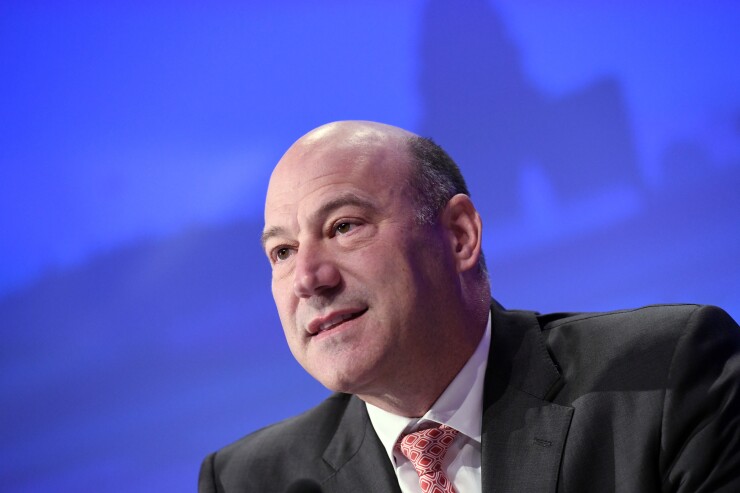WASHINGTON — Senate lawmakers will soon introduce a bill that could more than quadruple the current $50 billion threshold to be considered a systemically important bank, a top Trump administration official said Monday.
“There is a shot that we get something done on the $50 billion dollar level this year in a bipartisan way,” National Economic Council Director Gary Cohn told bank executives at the American Bankers Association annual convention in Chicago. “What we arguing about is where we end up.”
Senate Banking Committee Chairman Mike Crapo, R-Idaho, has been working with the panel’s top Democrat, Sherrod Brown of Ohio, on a proposal that would roll back some financial regulations to help spur economic growth. The $50 billion threshold, which subjects banks above that level to tougher capital and liquidity requirements, may be part of the bipartisan package.

Cohn speculated that the final proposal would likely raise the asset threshold to at least $200 billion.
“The first number is going to start with ‘2’ and the only thing we are arguing is what the next two numbers are … and they can be zeros or anything higher,” said Cohn who described an asset threshold of $225 billion being “somewhere in the middle” of what is being discussed, suggesting that the plan could raise the threshold as high as $250 billion.
However, many banks might prefer a different plan proposed by Rep. Blaine Luetkemeyer, R-Mo., that would do away with the asset threshold altogether and instead use an indicator test that measures a bank’s risk. That bill passed the House Financial Services Committee last week with the support of 13 Democrats.
Cohn said he also supports that idea because “I don’t love the fact that we are just creating an artificial line.”
However, last week some Democrats expressed reservations about the Luetkemeyer approach.
The bill “goes way too far in reversing strong oversight of the nation’s largest banks,” said Rep. Maxine Waters, D-Calif.
Cohn stressed that “we do think there is some real agreement on raising levels,” including a $10 billion-asset level that requires banks above that line to conduct stress tests.
The Senate bill is likely to be significantly less broad than the House approach. Cohn acknowledged that there would be key differences and said he’s been in touch with Financial Services Committee chairman Jeb Hensarling, R-Tex.
“We have also dealt with Hensarling and what he is willing to accommodate based on what comes out of the Senate,” said Cohn.
The administration is also in the process of installing new leaders at the regulatory agencies.
“We are completely trying to change the tone” of regulation, said Cohn, who said banks became over-regulated after the 2008 financial crisis.
“We have chosen new people in all of the leadership of all of the various regulatory bodies that share our regulatory agenda,” said Cohn.
But he acknowledged that it has taken significant time.
“Getting our personnel into place has taken a lot longer than any one of use would have ever imagined,” he said.
He said the FBI is currently doing a background check on a nominee to fill a community bank role at the Federal Reserve Board, and that the nomination will be coming soon.
The Financial Stability Oversight Council will also be key in rolling back financial regulations, said Cohn.
“FSOC is actually sort of very quietly done some very interesting things,” said Cohn of the council, which is chaired by Treasury Secretary Steven Mnuchin and recently voted to de-designate AIG as a systemically important non-bank.
“That is a big movement,” said Cohn.
He noted that an FSOC headed by Obama-appointed regulators would be more likely to designate additional firms rather than rolling back the designation, which gives the Fed oversight powers and imposes higher capital requirements.
FSOC is “coordinating what is going on” with regulations, said Cohn.
Rolling back regulations is one of a three pillar stool for the administration’s economic agenda said Cohn. The other two are tax reform and infrastructure development.
ABA President and Chief Executive Officer Rob Nichols, who was interviewing Cohn during the discussion, said one concern that the ABA has on tax reform is there have been discussions on a limitation of net interest expensing.
Nichols said taking away the deduction could impact loan growth, but Cohn said if Congress can pass legislation lowering the middle class and corporate tax rate, banks will benefit from economic growth that would outweigh the interest deduction.
“Real loan growth comes when the economy is growing and when your clients are bullish about the economy,” said Cohn.
Deducting interest “doesn’t ultimately play into” the decision by a business to borrow, he said.
Cohn said he hope Congress can move this year because it “gets harder and harder” if tax reform efforts slip into next year.
“The opportunity is now,” said Cohn.





